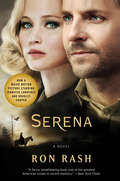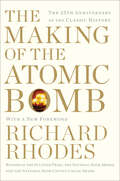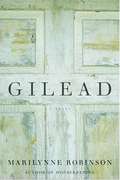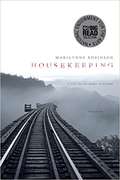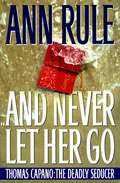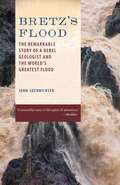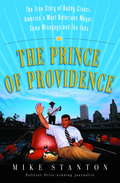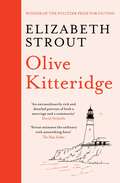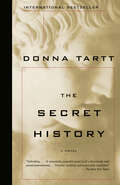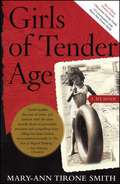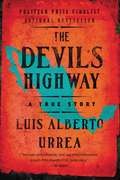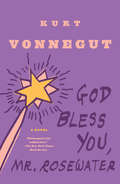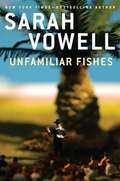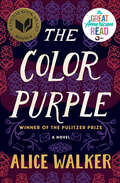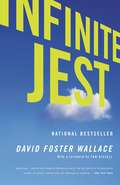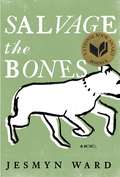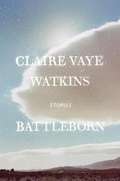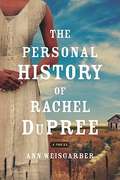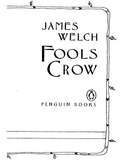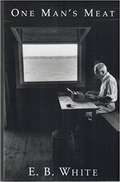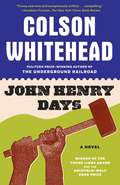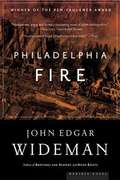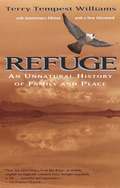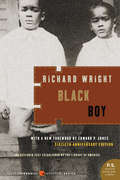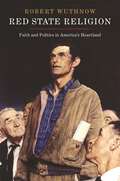Special Collections
Road Trip
Description: Nothing says freedom and adventure like a road trip! From Alabama to Wyoming, we have reads for every state. So hitch a ride with this collection of fiction and nonfiction books. #adults
- Table View
- List View
Serena
by Ron RashThe year is 1929, and newlyweds George and Serena Pemberton travel from Boston to the North Carolina mountains where they plan to create a timber empire.
Although George has already lived in the camp long enough to father an illegitimate child, Serena is new to the mountains-but she soon shows herself to be the equal of any man, overseeing crews, hunting rattle-snakes, even saving her husband's life in the wilderness.
Together this lord and lady of the woodlands ruthlessly kill or vanquish all who fall out of favor. Yet when Serena learns that she will never bear a child, she sets out to murder the son George fathered without her.
Mother and child begin a struggle for their lives, and when Serena suspects George is protecting his illegitimate family, the Pembertons' intense, passionate marriage starts to unravel as the story moves toward its shocking reckoning.
Rash's masterful balance of violence and beauty yields a riveting novel that, at its core, tells of love both honored and betrayed.
The Making of the Atomic Bomb
by Richard Rhodes**Winner of the Pulitzer Prize, the National Book Award, and the National Book Critics Circle Award** The definitive history of nuclear weapons—from the turn-of-the-century discovery of nuclear energy to J. Robert Oppenheimer and the Manhattan Project—this epic work details the science, the people, and the sociopolitical realities that led to the development of the atomic bomb.This sweeping account begins in the 19th century, with the discovery of nuclear fission, and continues to World War Two and the Americans’ race to beat Hitler’s Nazis. That competition launched the Manhattan Project and the nearly overnight construction of a vast military-industrial complex that culminated in the fateful dropping of the first bombs on Hiroshima and Nagasaki.Reading like a character-driven suspense novel, the book introduces the players in this saga of physics, politics, and human psychology—from FDR and Einstein to the visionary scientists who pioneered quantum theory and the application of thermonuclear fission, including Planck, Szilard, Bohr, Oppenheimer, Fermi, Teller, Meitner, von Neumann, and Lawrence. From nuclear power’s earliest foreshadowing in the work of H.G. Wells to the bright glare of Trinity at Alamogordo and the arms race of the Cold War, this dread invention forever changed the course of human history, and The Making of The Atomic Bomb provides a panoramic backdrop for that story. Richard Rhodes’s ability to craft compelling biographical portraits is matched only by his rigorous scholarship. Told in rich human, political, and scientific detail that any reader can follow, The Making of the Atomic Bomb is a thought-provoking and masterful work.
Gilead
by Marilynne RobinsonIn 1956, toward the end of Reverend John Ames's life, he begins a letter to his young son, an account of himself and his forebears. Ames is the son of an Iowan preacher and the grandson of a minister who, as a young man in Maine, saw a vision of Christ bound in chains and came west to Kansas to fight for abolition: He "preached men into the Civil War," then, at age fifty, became a chaplain in the Union Army, losing his right eye in battle.
Reverend Ames writes to his son about the tension between his father--an ardent pacifist--and his grandfather, whose pistol and bloody shirts, concealed in an army blanket, may be relics from the fight between the abolitionists and those settlers who wanted to vote Kansas into the union as a slave state. And he tells a story of the sacred bonds between fathers and sons, which are tested in his tender and strained relationship with his namesake, John Ames Boughton, his best friend's wayward son.
This is also the tale of another remarkable vision--not a corporeal vision of God but the vision of life as a wondrously strange creation. It tells how wisdom was forged in Ames's soul during his solitary life, and how history lives through generations, pervasively present even when betrayed and forgotten.
Pulitzer Prize Winner
Housekeeping
by Marilynne RobinsonA modern classic, Housekeeping is the story of Ruth and her younger sister, Lucille, who grow up haphazardly, first under the care of their competent grandmother, then of two comically bumbling great-aunts, and finally of Sylvie, their eccentric and remote aunt.
The family house is in the small Far West town of Fingerbone set on a glacial lake, the same lake where their grandfather died in a spectacular train wreck, and their mother drove off a cliff to her death.
It is a town "chastened by an outsized landscape and extravagant weather, and chastened again by an awareness that the whole of human history had occurred elsewhere."
Ruth and Lucille's struggle toward adulthood beautifully illuminates the price of loss and survival, and the dangerous and deep undertow of transience.
And Never Let Her Go
by Ann RuleFrom America's most celebrated true-crime writer comes the heartbreaking real-life drama of a doomed young woman hopelessly trapped in a web of sexual intrigue, political manipulation, and emotional deception by her charming and successful—but ultimately deadly—lover.The author of fifteen New York Times national bestsellers, Ann Rule, a former Seattle policewoman, has researched thousands of homicides and understands every facet of murder investigation. Now, in the most complex and shocking book of her long career, she delves into the motivation that drove a seemingly successful man to kill, and she explores heretofore unknown aspects of a fatal affair between a beautiful young woman who moved confidently in the heady world of the upper echelons of government and a widely admired millionaire attorney who was an immensely popular political figure. On June 27, 1996, thirty-year-old Anne Marie Fahey, who was the scheduling secretary for the governor of Delaware, had dinner with a man she had been having a secret affair with for more than two years. "Tommy" Capano, forty-seven, was perhaps the most politically powerful man in Wilmington. Son of a wealthy contractor, former state prosecutor, partner in a prestigious law firm, advisor to governors and mayors, Tom Capano had a soft-spoken and considerate manner that endeared him to many. Although recently estranged from his wife, he was a devoted father to his four beautiful young daughters, the trusted son of his widowed mother, and the backbone of his extended family. But sometime after 9:15 that night when Anne Marie and Tom left a Philadelphia restaurant, something terrible happened to Anne Marie. It would be forty-eight hours before her brothers and sisters realized that she had disappeared entirely. Ann Rule brilliantly traces the lives of both Fahey and Capano as she discloses the intimate details of their ill-fated bonding. A vulnerable, trusting woman becomes spellbound by a charming, duplicitous married man, and what begins as a seemingly unremarkable affair is slowly transformed into an obsessive, convoluted, and deadly relationship. Through her impeccable research, Rule peels away layer after layer of deception to reveal a man who lived a secret life for decades, a man so greedy that he would sacrifice anyone to gain what he desired. One of his many mistresses—all of whom were unknown to one another—was Deborah MacIntyre, an attractive and wealthy member of one of Wilmington's oldest families and an administrator of an elite private school. She, too, would become part of the mystery surrounding Anne Marie's disappearance. As three prominent families are destroyed to satisfy one man's jealous obsessions, this unfathomable tragedy becomes a tale that few would believe if it were presented as fiction. Shockingly, it is all true. Destined to become a classic, And Never Let Her Go is a riveting account of forbidden love and murder among the rich and powerful, and a chilling insight into the evil that sometimes hides behind even the most charming façade.
Bretz's Flood
by John SoennichsenThe land between Idaho and the Cascade Mountains is characterized by gullies, coulees, and deserts--in geologic terms, it is a wholly unique place on the earth.
Legendary geologist J Harlen Bretz, starting in the 1920s, was the first to explore the area.
Bretz, a former science teacher at Franklin High School in Seattle and then a professor at the University of Washington and later the University of Chicago, eventually formed the theory that the land was scoured in a virtual instant by a massive flood.
His original thinking was rewarded with various forms of public and academic humiliation.
In the mid-twentieth century, his theory sounded a bit too much like the biblical flood, and the scientific world wanting nothing to do with that sort of idea. (Ironically, Bretz was an avowed atheist, so this was hardly his inspiration.)
Bretz's Flood tells the dramatic story of this scientific maverick-how he came to study the region, his radical theory that a huge flood created it, and how the mainstream geologic community campaigned to derail him from pursuing an idea that satellite photos would confirm decades later.
The Prince of Providence
by Mike StantonCOP: "Buddy, I think this is a whorehouse."
BUDDY CIANCI: "Now I know why they made you a detective."
Welcome to Providence, Rhode Island, where corruption is entertainment and Mayor Buddy Cianci presided over the longest-running lounge act in American politics.
In The Prince of Providence, Pulitzer Prize-winning journalist Mike Stanton tells a classic story of wiseguys, feds, and politicians on a carousel of crime and redemption.
Buddy Cianci was part urban visionary, part Tony Soprano--a flawed political genius in the mold of Huey Long and James Michael Curley. His lust for power cost him his marriage, his family, and close friendships.
Yet he also revitalized the city of Providence, where ethnic factions jostle with old-moneyed New Englanders and black-clad artists from the Rhode Island School of Design rub shoulders with scam artists from City Hall.
For nearly a quarter of a century, Cianci dominated this uneasy melting pot. During his first administration, twenty-two political insiders were convicted of corruption.
In 1984, Cianci resigned after pleading guilty to felony assault, for torturing a man he suspected of sleeping with his estranged wife.
In 1990, in a remarkable comeback, Cianci was elected mayor once again; he went on to win national acclaim for transforming a dying industrial city into a trendy arts and tourism mecca.
But in 2001, a federal corruption probe dubbed Operation Plunder Dome threatened to bring the curtain down on Cianci once and for all. Mike Stanton takes readers on a remarkable journey through the underside of city life, into the bizarre world of the mayor and his supporting cast, including:
* "Buckles" Melise, the city official in charge of vermin control, who bought Providence twice as much rat poison as the city of Cleveland, which was at the time four times as large, and wound up increasing Providence's rat population. During a garbage strike, Buckles sledgehammered one city employee and stuck his thumb in another's eye. Cianci would later describe this as "great public policy."
* Anthony "the Saint" St. Laurent, a major Rhode Island bookmaker and loan shark, who tried to avoid prison by citing his medical need for forty bowel irrigations a day, thus earning himself the nickname "Public Enema Number One."
* Dennis Aiken, a celebrated FBI agent and public corruption expert, who asked to be sent to "the Louisiana of the North," where he enlisted an undercover businessman to expose the corrupt secrets of Cianci's City Hall.
The Prince of Providence is a colorful and engrossing account of one of the most tragicomic figures in modern American life--and the city he transformed.
Olive Kitteridge
by Elizabeth StroutOlive Kitteridge: indomitable, compassionate and often unpredictable.
A retired schoolteacher in a small coastal town in Maine, as she grows older she struggles to make sense of the changes in her life. She is a woman who sees into the hearts of those around her, their triumphs and tragedies.
We meet her stoic husband, bound to her in a marriage both broken and strong, and a young man who aches for the mother he lost - and whom Olive comforts by her mere presence, while her own son feels overwhelmed by her complex sensitivities.
A penetrating, vibrant exploration of the human soul, the story of Olive Kitteridge will make you laugh, nod in recognition, wince in pain, and shed a tear or two.
Winner of the Pulitzer Prize for Fiction
Finalist for the National Book Critics Circle Award
And now a major HBO mini-series starring Frances McDormand
The Secret History
by Donna TarttA READ WITH JENNA BOOK CLUB PICK • ONE OF TIME MAGAZINE'S 100 BEST MYSTERY AND THRILLER BOOKS OF ALL TIME • INTERNATIONAL BESTSELLER • A contemporary literary classic and "an accomplished psychological thriller ... absolutely chilling" (Village Voice), from the Pulitzer Prize–winning author of The Goldfinch.One of The Atlantic&’s Great American Novels of the Past 100 YearsUnder the influence of a charismatic classics professor, a group of clever, eccentric misfits at a New England college discover a way of thought and life a world away from their banal contemporaries. But their search for the transcendent leads them down a dangerous path, beyond human constructs of morality.&“A remarkably powerful novel [and] a ferociously well-paced entertainment . . . Forceful, cerebral, and impeccably controlled.&” —The New York Times
Girls of Tender Age
by Mary-Ann Tirone SmithIn Girls of Tender Age, Mary-Ann Tirone Smith fully articulates with great humor and tenderness the wild jubilance of an extended French-Italian family struggling to survive in a post-World War II housing project in Hartford, Connecticut. Smith seamlessly combines a memoir whose intimacy matches that of Angela's Ashes with the tale of a community plagued by a malevolent predator that holds the emotional and cultural resonance of The Lovely Bones.Smith's Hartford neighborhood is small-town America, where everyone’s door is unlocked and the school, church, library, drugstore, 5 & 10, grocery, and tavern are all within walking distance. Her family is peopled with memorable characters—her possibly psychic mother who's always on the verge of a nervous breakdown, her adoring father who makes sure she has something to eat in the morning beyond her usual gulp of Hershey’s syrup, her grandfather who teaches her to bash in the heads of the eels they catch on Long Island Sound, Uncle Guido who makes the annual bagna cauda, and the numerous aunts and cousins who parade through her life with love and food and endless stories of the old days. And then there’s her brother, Tyler. Smith's household was “different.” Little Mary-Ann couldn't have friends over because her older brother, Tyler, an autistic before anyone knew what that meant, was unable to bear noise of any kind. To him, the sound of crying, laughing, phones ringing, or toilets flushing was “a cloud of barbed needles” flying into his face. Subject to such an assault, he would substitute that pain with another: he'd try to chew his arm off. Tyler was Mary-Ann's real-life Boo Radley, albeit one whose bookshelves sagged under the weight of the World War II books he collected and read obsessively. Hanging over this rough-and-tumble American childhood is the sinister shadow of an approaching serial killer. The menacing Bob Malm lurks throughout this joyous and chaotic family portrait, and the havoc he unleashes when the paths of innocence and evil cross one early December evening in 1953 forever alters the landscape of Smith's childhood. Girls of Tender Age is one of those books that will forever change its readers because of its beauty and power and remarkable wit.
The Devils Highway
by Luis Alberto UrreaIn May 2001, a group of men attempted to cross the border into the desert of southern Arizona, through the deadliest region of the continent, a place called the Devil's Highway.
Fathers and sons, brothers and strangers, entered a desert so harsh and desolate that even the Border Patrol is afraid to travel through it. Twelve came back out.
Now, Luis Alberto Urrea tells the story of this modern odyssey. He takes us back to the small towns and unpaved cities south of the border, where the poor fall prey to dreams of a better life and the sinister promises of smugglers.
We meet the men who will decide to make the crossing along the Devil's Highway and, on the other side of the border, the men who are ready to prevent them from reaching their destination.
Urrea reveals exactly what happened when the twenty-six headed into the wasteland, and how they were brutally betrayed by the one man they had trusted most. And from that betrayal came the inferno, a descent into a world of cactus spines, labyrinths of sand, mountains shaped like the teeth of a shark, and a screaming sun so intense that even at midnight the temperature only drops to 97 degrees.
And yet, the men would not give up. The Devil's Highway is a story of astonishing courage and strength, of an epic battle against circumstance. These twenty-six men would look the Devil in the eyes - and some of them would not blink.
God Bless You, Mr. Rosewater
by Kurt Vonnegut Jr.God Bless You, Mr. Rosewater is a comic masterpiece.
Eliot Rosewater, drunk, volunteer fireman, and president of the fabulously rich Rosewater foundation, is about to attempt a noble experiment with human nature. . . with a little help from writer Kilgore Trout.
The result is Vonnegut's funniest satire, an etched-in-acid portrayal of the greed, hypocrisy, and follies of the flesh we are all heir to.
Unfamiliar Fishes
by Sarah VowellOf all the countries the United States invaded or colonized in 1898, Sarah Vowell considers the story of the Americanization of Hawaii to be the most intriguing.
From the arrival of the New England missionaries in 1820, who came to Christianize the local heathens, to the coup d'état led by the missionaries' sons in 1893, overthrowing the Hawaiian queen, the events leading up to American annexation feature a cast of beguiling, if often appalling or tragic, characters.
Whalers who fire cannons at the Bible-thumpers denying them their god-given right to whores; an incestuous princess pulled between her new god and her brother-husband; sugar barons, con men, Theodore Roosevelt, and the last Hawaiian queen, a songwriter whose sentimental ode "Aloha 'Oe" serenaded the first Hawaiian-born president of the United States during his 2009 inaugural parade.
With her trademark wry insights and reporting, Vowell sets out to discover the odd, emblematic, and exceptional history of the fiftieth state. In examining the place where Manifest Destiny got a sunburn, she finds America again, warts and all.
The Color Purple
by Alice WalkerThe Pulitzer Prize– and National Book Award–winning novel is now a new, boldly reimagined film from producers Oprah Winfrey and Steven Spielberg, starring Taraji P. Henson, Danielle Brooks, and Fantasia Barrino.A PBS Great American Read Top 100 Pick Celie has grown up poor in rural Georgia, despised by the society around her and abused by her own family. She strives to protect her sister, Nettie, from a similar fate, and while Nettie escapes to a new life as a missionary in Africa, Celie is left behind without her best friend and confidante, married off to an older suitor, and sentenced to a life alone with a harsh and brutal husband. In an attempt to transcend a life that often seems too much to bear, Celie begins writing letters directly to God. The letters, spanning 20 years, record a journey of self-discovery and empowerment guided by the light of a few strong women. She meets Shug Avery, her husband&’s mistress and a jazz singer with a zest for life, and her stepson&’s wife, Sofia, who challenges her to fight for independence. And though the many letters from Celie&’s sister are hidden by her husband, Nettie&’s unwavering support will prove to be the most breathtaking of all.The Color Purple has sold more than five million copies, inspired an Academy Award-nominated film starring Oprah Winfrey and directed by Steven Spielberg, and been adapted into a Tony-winning Broadway musical. Lauded as a literary masterpiece, this is the groundbreaking novel that placed Walker &“in the company of Faulkner&” (The Nation), and remains a wrenching—yet intensely uplifting—experience for new generations of readers.This ebook features a new introduction written by the author on the 25th anniversary of publication, and an illustrated biography of Alice Walker including rare photos from the author&’s personal collection. The Color Purple is the 1st book in the Color Purple Collection, which also includes The Temple of My Familiar and Possessing the Secret of Joy.
Infinite Jest
by David Foster WallaceA gargantuan, mind-altering comedy about the Pursuit of Happiness in America set in an addicts' halfway house and a tennis academy, and featuring the most endearingly screwed-up family to come along in recent fiction, Infinite Jest explores essential questions about what entertainment is and why it has come to so dominate our lives; about how our desire for entertainment affects our need to connect with other people; and about what the pleasures we choose say about who we are.
Equal parts philosophical quest and screwball comedy, Infinite Jest bends every rule of fiction without sacrificing for a moment its own entertainment value.
It is an exuberant, uniquely American exploration of the passions that make us human - and one of those rare books that renew the idea of what a novel can do.
Salvage the Bones
by Jesmyn Ward
As Hurricane Katrina is building over the Gulf of Mexico, a poor family deals with the life and breeding of a winner pitbull and a teen's hidden pregnancy.
Each family member has their own story and strong character.
A hurricane is building over the Gulf of Mexico, threatening the coastal town of Bois Sauvage, Mississippi, and Esch's father is growing concerned. A hard drinker, largely absent, he doesn't show concern for much else until he gets word of the approaching hurricane.
Esch and her three brothers are stocking food, but there isn't much to save. Lately, Esch can't keep down what food she gets; she's fourteen and pregnant. Her brother Skeetah is sneaking scraps for his prized pitbull's new litter, dying one by one in the dirt.
Meanwhile, brothers Randall and Junior try to stake their claim in a family long on child's play and short on parenting.
As the twelve days that make up the novel's framework yield to their dramatic conclusion, this unforgettable family-motherless children sacrificing for one another as they can, protecting and nurturing where love is scarce-pulls itself up to face another day.
A big-hearted novel about familial love and community against all odds, and a wrenching look at the lonesome, brutal, and restrictive realities of rural poverty, Salvage the Bones is muscled with poetry, revelatory, and real.
Winner of the 2011 National Book Award.
Battleborn
by Claire Vaye WatkinsIn each of these ten unforgettable stories, Claire Vaye Watkins writes her way fearlessly into the mythology of the American West, utterly reimagining it. Her characters orbit around the region's vast spaces, winning redemption despite - and often because of - the hardship and violence they endure.
The arrival of a foreigner transforms the exchange of eroticism and emotion at a prostitution ranch.
A prospecting hermit discovers the limits of his rugged individualism when he tries to rescue an abused teenager.
Decades after she led her best friend into a degrading encounter in a Vegas hotel room, a woman feels the aftershock.
Most bravely of all, Watkins takes on - and reinvents - her own troubled legacy in a story that emerges from the mayhem and destruction of Helter Skelter.
Arcing from the sweeping and sublime to the minute and personal, from Gold Rush to ghost town to desert to brothel, the collection echoes not only in its title but also in its fierce, undefeated spirit the motto of her home state.
Winner of the 2012 Story Prize
Recipient of the 2012 American Academy of Arts and Letters Rosenthal Foundation Award
A National Book Foundation "5 Under 35" fiction writer of 2012
The Personal History of Rachel DuPree
by Ann Weisgarber
It is 1917 in the South Dakota Badlands, and summer has been hard.
Fourteen years have passed since Rachel and Isaac DuPree left Chicago to stake a claim in this unforgiving land.
Isaac, a former Buffalo Soldier, is fiercely proud: black families are rare in the West, and black ranchers even rarer.
But it hasn't rained in months, the cattle bellow with thirst, and supplies are dwindling.
Pregnant, and struggling to feed her family, Rachel is isolated by more than just geography.
She is determined to give her surviving children the life they deserve, but she knows that her husband will never leave his ranch.
Moving and majestic, The Personal History of Rachel DuPree is an unforgettable novel about love and loyalty, homeland and belonging.
Above all, it is the story of one woman's courage in the face of the most punishing adversity.
Short-listed for the Orange Award for New Writers & long-listed for the Orange Prize
Fools Crow
by James WelchIn the Two Medicine Territory of Montana, the Lone Eaters, a small band of Blackfeet Indians, are living their immemorial life.
The men hunt and mount the occasional horse-taking raid or war party against the enemy Crow. The women tan the hides, sew the beadwork, and raise the children.
But the year is 1870, and the whites are moving into their land. Fools Crow, a young warrior and medicine man, has seen the future and knows that the newcomers will punish resistance with swift retribution.
First published to broad acclaim in 1986, Fools Crow is James Welch's stunningly evocative portrait of his people's bygone way of life.
One Man's Meat
by E. B. WhiteCollection of essays on the author's personal life written for The New Yorker Harper's Magazine.
John Henry Days
by Colson WhiteheadColson Whitehead’s eagerly awaited and triumphantly acclaimed new novel is on one level a multifaceted retelling of the story of John Henry, the black steel-driver who died outracing a machine designed to replace him.
On another level it’s the story of a disaffected, middle-aged black journalist on a mission to set a record for junketeering who attends the annual John Henry Days festival.
It is also a high-velocity thrill ride through the tunnel where American legend gives way to American pop culture, replete with p. r. flacks, stamp collectors, blues men , and turn-of-the-century song pluggers.
John Henry Days is an acrobatic, intellectually dazzling, and laugh-out-loud funny book that will be read and talked about for years to come.
Philadelphia Fire
by John Edgar WidemanFrom "one of America's premier writers of fiction" (New York Times) comes this novel inspired by the 1985 police bombing of a West Philadelphia row house owned by the back-to-nature, Afrocentric cult known as Move.
The bombing killed eleven people and started a fire that destroyed sixty other houses.
At the center of the story is Cudjoe, a writer and exile who returns to his old neighborhood after spending a decade fleeing from his past, and his search for the lone survivor of the fire - a young boy who was seen running from the flames.
Black Boy
by Richard WrightRichard Wright grew up in the woods of Mississippi, with poverty, hunger, fear, and hatred. He lied, stole, and raged at those around him; at six he was a "drunkard," hanging about taverns.
Surly, brutal, cold, suspicious, and self-pitying, he was surrounded on one side by whites who were either indifferent to him, pitying, or cruel, and on the other by blacks who resented anyone trying to rise above the common lot.
Black Boy is Richard Wright's powerful account of his journey from innocence to experience in the Jim Crow South.
It is at once an unashamed confession and a profound indictment-a poignant and disturbing record of social injustice and human suffering.
[This text is listed as an example that meets Common Core Standards in English language arts in grades 11-12 at http://www.corestandards.org.]
Red State Religion
by Robert WuthnowWhat Kansas really tells us about red state AmericaNo state has voted Republican more consistently or widely or for longer than Kansas. To understand red state politics, Kansas is the place. It is also the place to understand red state religion. The Kansas Board of Education has repeatedly challenged the teaching of evolution, Kansas voters overwhelmingly passed a constitutional ban on gay marriage, the state is a hotbed of antiabortion protest—and churches have been involved in all of these efforts. Yet in 1867 suffragist Lucy Stone could plausibly proclaim that, in the cause of universal suffrage, "Kansas leads the world!" How did Kansas go from being a progressive state to one of the most conservative?In Red State Religion, Robert Wuthnow tells the story of religiously motivated political activism in Kansas from territorial days to the present. He examines how faith mixed with politics as both ordinary Kansans and leaders such as John Brown, Carrie Nation, William Allen White, and Dwight Eisenhower struggled over the pivotal issues of their times, from slavery and Prohibition to populism and anti-communism. Beyond providing surprising new explanations of why Kansas became a conservative stronghold, the book sheds new light on the role of religion in red states across the Midwest and the United States. Contrary to recent influential accounts, Wuthnow argues that Kansas conservatism is largely pragmatic, not ideological, and that religion in the state has less to do with politics and contentious moral activism than with relationships between neighbors, friends, and fellow churchgoers.This is an important book for anyone who wants to understand the role of religion in American political conservatism.
